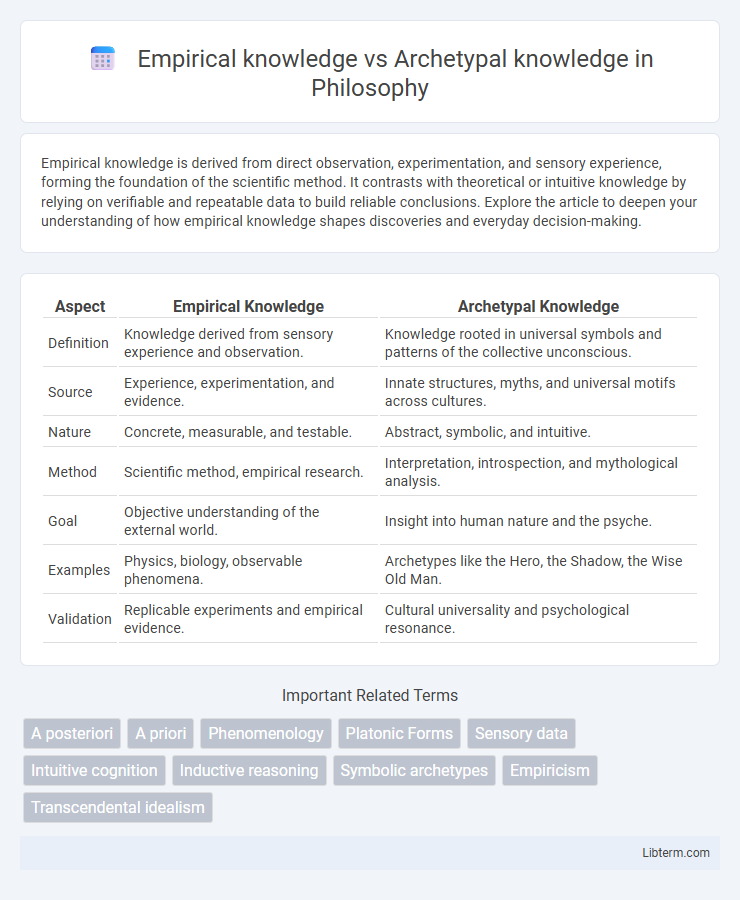Empirical knowledge is derived from direct observation, experimentation, and sensory experience, forming the foundation of the scientific method. It contrasts with theoretical or intuitive knowledge by relying on verifiable and repeatable data to build reliable conclusions. Explore the article to deepen your understanding of how empirical knowledge shapes discoveries and everyday decision-making.
Table of Comparison
| Aspect | Empirical Knowledge | Archetypal Knowledge |
|---|---|---|
| Definition | Knowledge derived from sensory experience and observation. | Knowledge rooted in universal symbols and patterns of the collective unconscious. |
| Source | Experience, experimentation, and evidence. | Innate structures, myths, and universal motifs across cultures. |
| Nature | Concrete, measurable, and testable. | Abstract, symbolic, and intuitive. |
| Method | Scientific method, empirical research. | Interpretation, introspection, and mythological analysis. |
| Goal | Objective understanding of the external world. | Insight into human nature and the psyche. |
| Examples | Physics, biology, observable phenomena. | Archetypes like the Hero, the Shadow, the Wise Old Man. |
| Validation | Replicable experiments and empirical evidence. | Cultural universality and psychological resonance. |
Defining Empirical Knowledge
Empirical knowledge is defined as information acquired through sensory experience, observation, and experimentation, forming the basis of scientific inquiry and evidence-based understanding. It relies on tangible data and measurable phenomena, distinguishing it from archetypal knowledge, which is rooted in universal symbols, myths, and collective unconscious patterns. Empirical knowledge emphasizes verifiable facts that can be tested and replicated across different contexts.
Understanding Archetypal Knowledge
Archetypal knowledge represents universal patterns, symbols, and themes embedded in the collective unconscious, transcending individual experience. This form of knowledge offers deep insights into human behavior, mythology, and cultural narratives by connecting personal realities to shared, timeless motifs. Understanding archetypal knowledge enhances self-awareness and spiritual growth by revealing the underlying structures shaping thoughts, emotions, and societal roles.
Historical Perspectives on Knowledge Types
Historical perspectives distinguish empirical knowledge as information derived from sensory experience and observation, forming the foundation of the scientific method since the Enlightenment. Archetypal knowledge, rooted in Jungian psychology and ancient traditions, represents universal, symbolic patterns embedded in collective unconscious, influencing myths and cultural narratives across civilizations. The evolution of these knowledge types reflects the tension between measurable evidence and innate, symbolic understanding throughout intellectual history.
Methods of Acquiring Empirical Knowledge
Empirical knowledge is acquired through systematic observation, experimentation, and sensory experience, relying on scientific methods to gather data and verify hypotheses. Techniques such as controlled experiments, surveys, and longitudinal studies are fundamental methods for obtaining empirical knowledge, ensuring accuracy and repeatability. This contrasts with archetypal knowledge, which is derived from collective myths, symbolic patterns, and intuitive insight rather than direct empirical evidence.
The Role of Archetypes in Human Cognition
Archetypal knowledge serves as a fundamental cognitive framework, shaping human perception and decision-making through inherited symbolic patterns embedded in the collective unconscious. This form of knowledge contrasts with empirical knowledge, which relies on sensory data and experiential evidence gathered through observation and experimentation. Archetypes facilitate intuitive understanding and meaning-making by providing universal motifs that guide behavior and cultural expression across diverse societies.
Empirical Knowledge in Scientific Inquiry
Empirical knowledge in scientific inquiry relies on observation, experimentation, and evidence collection to understand natural phenomena, forming the foundation of the scientific method. This type of knowledge emphasizes reproducibility and falsifiability, ensuring that hypotheses are tested against measurable data. In contrast to archetypal knowledge, empirical knowledge adapts through continual evidence-based refinement, driving advancements in fields such as physics, biology, and chemistry.
Archetypal Knowledge in Philosophy and Mythology
Archetypal knowledge in philosophy and mythology represents universal symbols and patterns embedded in the collective unconscious, as explored by Carl Jung and comparative mythology studies. It conveys profound insights through recurring myths, rituals, and archetypes such as the Hero, the Shadow, and the Wise Old Man, revealing fundamental aspects of human experience and cognition. This form of knowledge contrasts with empirical knowledge by emphasizing symbolic meaning and intuitive understanding over sensory data and experimental validation.
Comparing Foundations: Evidence vs. Symbolism
Empirical knowledge is grounded in observable evidence and verifiable data obtained through sensory experience and scientific methods, prioritizing facts and measurable results. Archetypal knowledge relies on symbolic representations, mythic patterns, and universal themes that resonate collectively across cultures, emphasizing meaning and intuition over direct observation. The foundation of empirical knowledge is rooted in objective reality, while archetypal knowledge is based on subjective symbolic interpretation.
Impact on Modern Thought and Society
Empirical knowledge, grounded in observation and experimentation, drives scientific advancements and fuels technological innovation, shaping modern society's material progress and evidence-based decision-making. Archetypal knowledge, rooted in universal symbols and myths, influences cultural narratives, psychology, and collective identity, contributing to the understanding of human behavior and societal values. The interplay between empirical and archetypal knowledge enriches modern thought by integrating objective facts with symbolic meaning, fostering holistic approaches to problem-solving and cultural development.
Integrating Empirical and Archetypal Approaches
Integrating empirical and archetypal approaches enhances understanding by merging data-driven evidence with symbolic, universal patterns found across cultures. Empirical knowledge relies on observation, experimentation, and measurable outcomes, while archetypal knowledge draws from collective unconscious motifs and mythological frameworks. Combining these methodologies fosters a more holistic perspective in fields like psychology, anthropology, and cognitive science, enabling richer insights into human behavior and cultural phenomena.
Empirical knowledge Infographic

 libterm.com
libterm.com